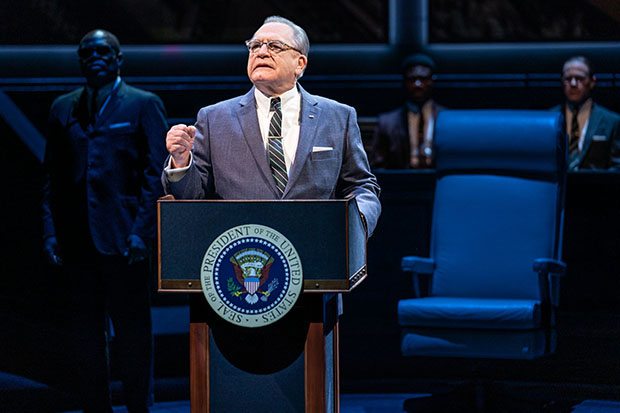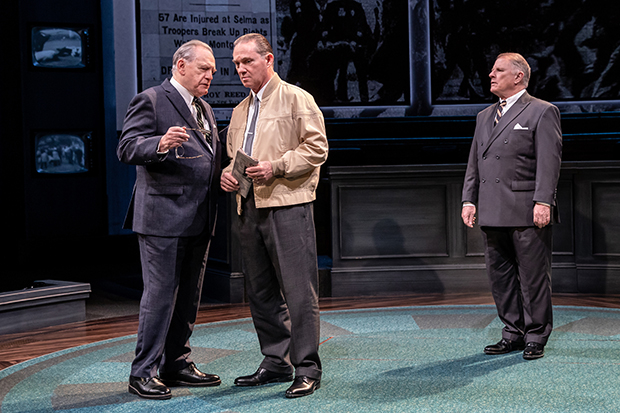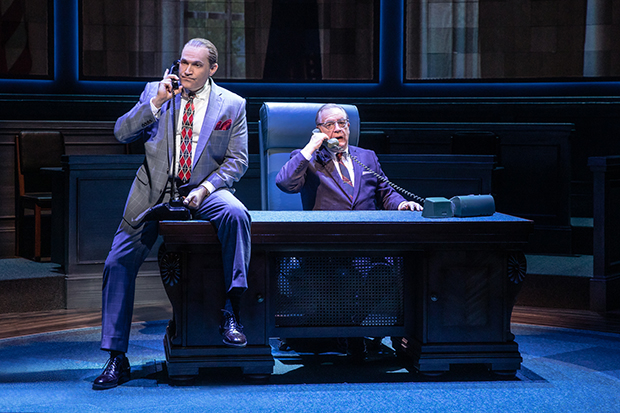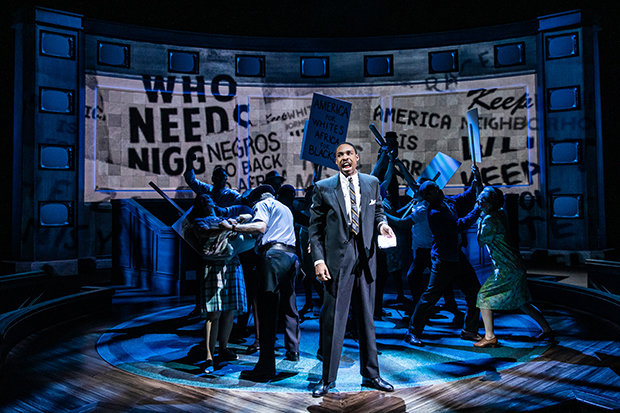The Great Society on Broadway and the America LBJ Built
The second part of Robert Schenkkan’s history of Lyndon B. Johnson opens at the Vivian Beaumont Theater.

(© Evan Zimmerman for MurphyMade)
Is America great? Could it be? One president truly believed that we could make America great (if not again, for the very first time) by providing for the material needs of all Americans, regardless of race or class. That was Lyndon B. Johnson, whose presidency is the subject of Robert Schenkkan's enthralling history play, The Great Society, now running on Broadway at the Vivian Beaumont Theater. As entertaining as it is informative, The Great Society is a fitting tribute to one of America's most underappreciated leaders.
We last encountered LBJ in Schenkkan's All the Way. Bryan Cranston starred as the unexpected 36th president of the United States, taking the reins of power in the wake of the assassination of John F. Kennedy. The Great Society focuses on a different period in Johnson's presidency, and stars Brian Cox as the wily chief executive attempting to complete the legacy of his liberal forerunners, Woodrow Wilson and Franklin Roosevelt, by signing a barrage of progressive legislation that will fundamentally remake America: Medicare, Medicaid, education reform, civil rights, and the "War on Poverty." But as Johnson soon discovers, in a country this diverse and divided, creating a Scandinavian-style welfare state isn't easy. Johnson also has to contend with the war in Vietnam, a foreign quagmire that threatens to torpedo his entire domestic agenda.

(© Evan Zimmerman for MurphyMade)
"A land war in Asia will be ruinous to everything we're trying to do," says Vice President Hubert Humphrey, portrayed by Richard Thomas as a particularly dim golden retriever. With his breathless delivery and wide-eyed visage, Thomas leaves no doubt as to how the lightweight Humphrey lost the presidency in 1968 to the sharklike Richard Nixon (David Garrison giving the standard Luciferian portrayal).
Schenkkan is scrupulous to a fault in his dramatization of history, perhaps knowing that amateur historians in the audience will inevitably accuse him of selectively presenting the facts. But The Great Society is no whitewash, and even audience favorites walk away looking a bit less lustrous. This occasionally leads to clunky exchanges, like when FBI director J. Edgar Hoover (Gordon Clapp) invades a meeting between the president and Senator Robert F. Kennedy (Bryce Pinkham doing Mayor Quimby from The Simpsons). As Kennedy assails Hoover for harassing the followers of Martin Luther King Jr. (a saintly yet shrewd Grantham Coleman), Hoover reminds Kennedy, "You weren't always such a fan of Dr. King's, not when you were the Attorney General and signing off on our surveillance efforts."
Obviously, such exchanges never occurred within the Oval Office (if at all), but in his busy contrivance, Schenkkan is able to give viewers an overview of the competing political interests that wrestled for America in the late '60s. Most admirably, ample time is reserved to illuminate the rifts within the civil rights movement between King and more radical leaders like Stokely Carmichael (a fiery Marchánt Davis).

(© Evan Zimmerman for MurphyMade)
In an infuriating and uncanny performance by Marc Kudisch, Chicago Mayor Richard Daley emerges as the clearest voice of Midwestern white Democrats who are uninterested in racial justice at best (downright hostile at worst). His big shoulders packed into a tailored suit, Kudisch moseys around the stage like a cartoon cowboy, ready to shoot. He defends the idea of "white neighborhoods" (the ones Dr. King wants to integrate), and he justifies his direction of Great Society funds to his vast (and mostly white) patronage network by reminding the president that he needs his votes in Congress. But if those votes come at the cost of undermining the purpose of Johnson's legislation, what's even the point?
Naturally, Schenkkan is sympathetic to his protagonist, whom Cox portrays with heartfelt gusto in an occasionally unsteady performance: I would like to believe that Cox's tendency to stumble over his lines is a clever manifestation of Johnson's slipping powers — but this is a problem that reveals itself in the earliest scenes. Still, Cox's charming hillbilly routine is masterful (almost as much as the real man's). It's hard not to like him.

(© Evan Zimmerman for MurphyMade)
Bill Rauch directs a clean and efficient production: Character changes are always clear thanks to Linda Cho's detailed period costumes and Tom Watson's excellent wig design (I particularly enjoyed the whimsical wisp of hair for Senator Everett Dirksen, played by Frank Wood). David Korins's thrust set provides for speedy, inexpensive scene changes: The president's desk rises from the stage, but a draped American flag instantly transforms it into a coffin, one of the thousands that returned stateside from Vietnam. Victoria Sagady keeps a running tally of war dead in her projections. She also uses real historical photographs to fill in Rauch's rough sketch. Rauch directs like he's staging a history play within Shakespeare's Wooden O — and it works.
If Schenkkan can be faulted, it is in painting Johnson's story as too much of a tragedy. No, Johnson didn't accomplish everything he set out to do. Yes, his mismanagement of Vietnam undermined his ability to lead at home, resulting in his withdrawal from the 1968 election. But his policy on so many issues (immigration, voting rights, and national health insurance, to name a few) remains the creaky status quo in America, waiting for the next ambitious legislator-executive to reform them for this century. Are any of today's presidential aspirants up to the task?









